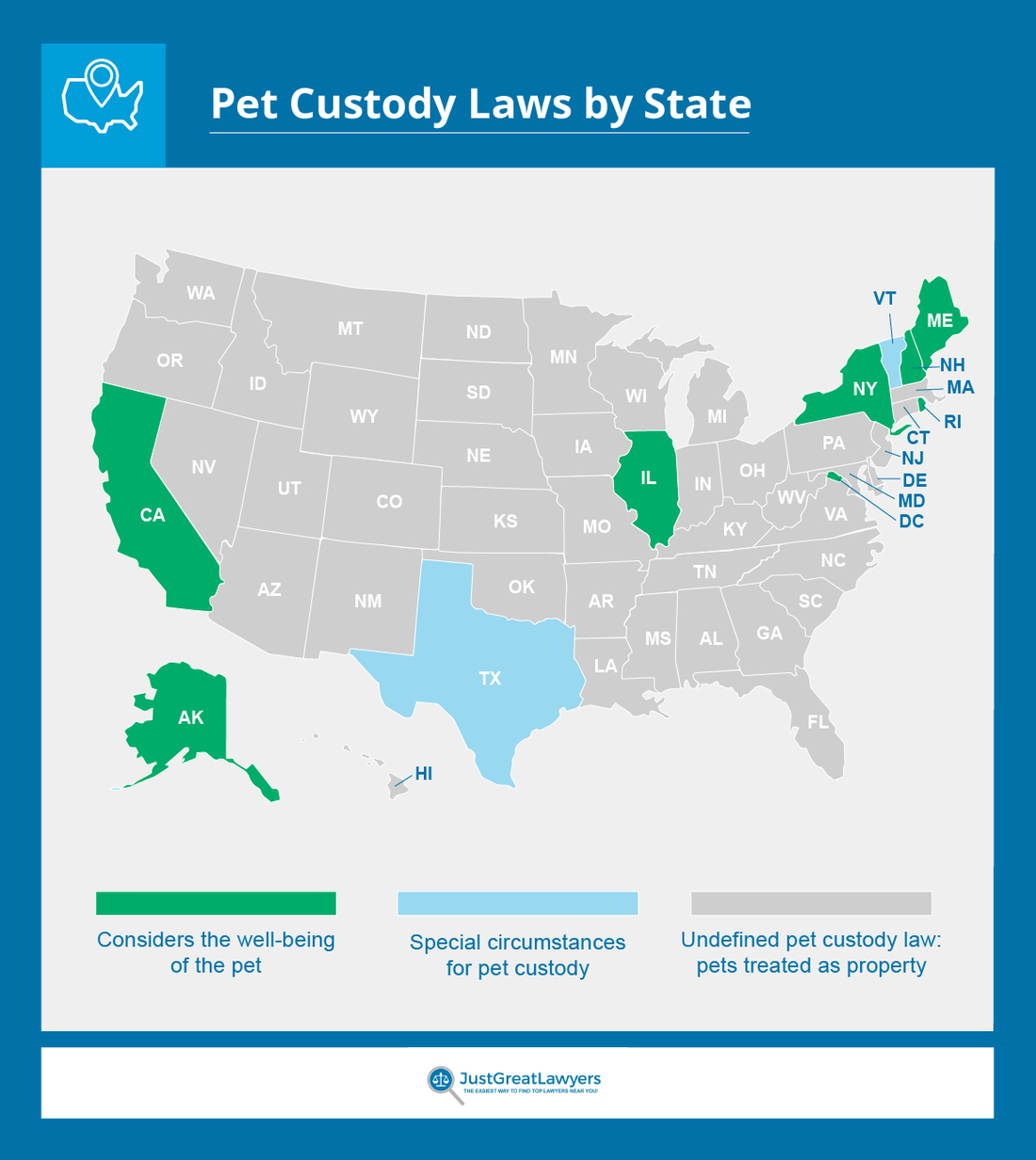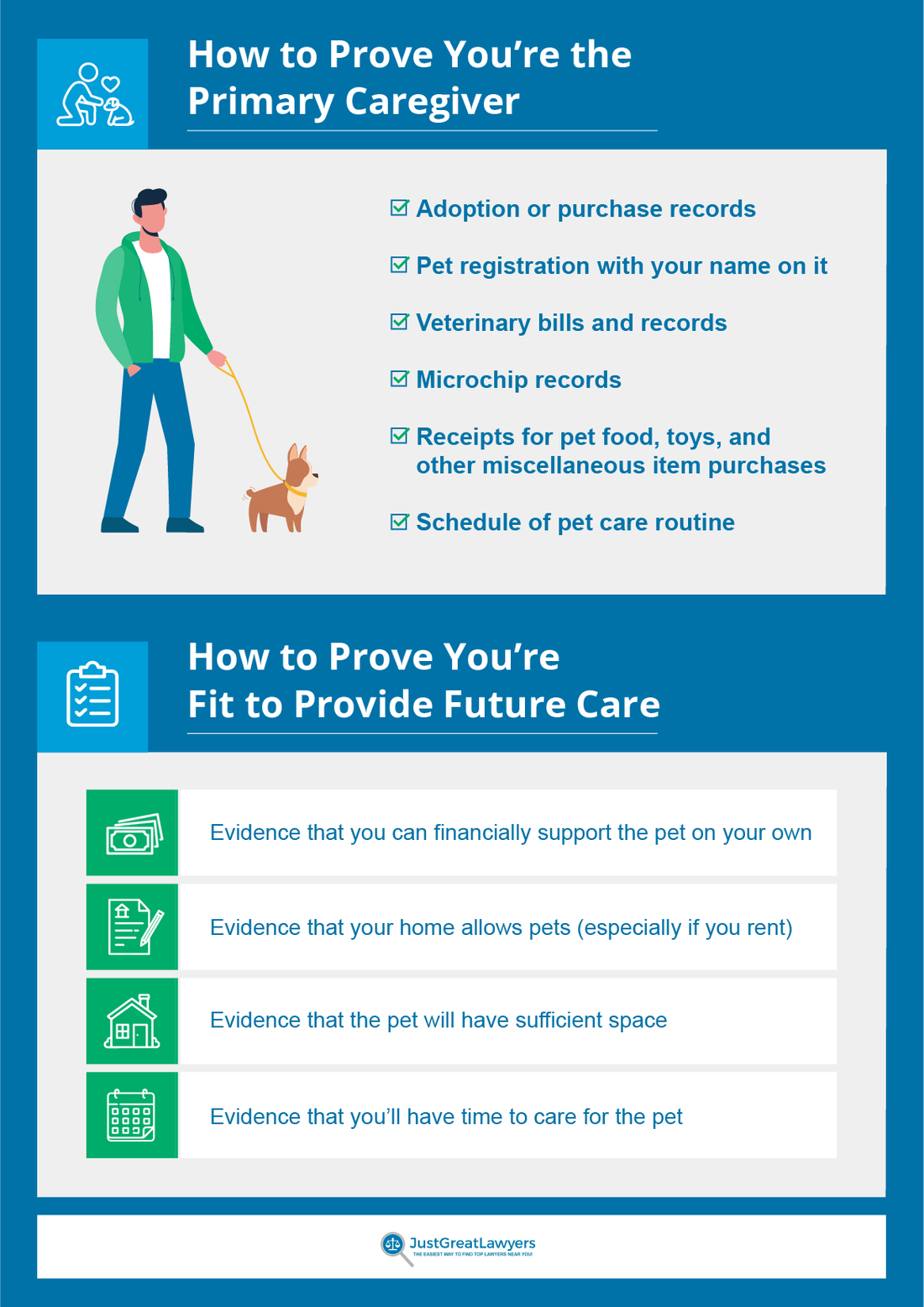
Separating from a spouse or partner is hard for anyone to go through, but it’s especially complicated for pet owners when both want ownership of a pet. If you’re going through a divorce or separation and have a pet with your partner, you may be wondering who gets custody of the pet, and the answer is it depends on the laws in your state.
This post offers solutions to pet custody disputes by explaining how laws vary by state and by providing a custody agreement template.
Here’s how pet custody laws look in different states. Keep in mind that these laws and precedents only apply in divorce cases, so they wouldn’t apply in a custody battle for a pet between a cohabiting unmarried couple.
Pet custody laws vary by state for couples who are going through a divorce. For unmarried couples that live together, you might need to sue and take action against your ex-partner in a civil court, because there aren’t laws that directly apply to pet custody issues in that situation.
Only a handful of states have laws in place that consider the well-being of a pet similarly to how a child’s well-being would be considered. Even though pets are part of the family too, most states still consider pets as property.
When a pet is considered property, that means that the person who purchased the animal is typically awarded ownership. However, some states consider who the primary caregiver of the pet is and who can take the best care of the pet. Some states may also look at pet custody differently if a child is involved, like Texas for example.

The following states consider the well-being or best interest of the pet in custody cases:
Alaska: Sole or joint ownership considering the well-being of the animal, meaning the environment or care it would receive the best
California: Sole or joint ownership based on the care of the pet
Illinois: Well-being of the animal and sole or joint custody
Maine: Considers the well-being of the animal, including other factors
New Hampshire: Considers the well-being of the animal
New York: Best interest of the pet
Rhode Island: Best interest of the pet and sole or joint custody
Washington D.C.: Best interest of the pet and sole or joint custody
In some states, special circumstances for pet custody may be taken into account.
Texas: Generally, Texas courts do not decide on the custody of pets and instead treat them like community property. However, if you are getting a divorce and have a child and are already filing for child custody, then that may change how your family pets are perceived in the case.
Vermont: The court may consider multiple factors in the decision of awarding pet custody, like welfare of the animal, including daily routines, how it’s cared for, the pet’s emotional connection to the owners and the animal’s best interest.
Most states in the U.S., aside from those listed above, consider pets as personal property for sole custody. Usually, this means that whoever purchased the pet or was the primary caregiver (depending on the state) is awarded custody.
There aren’t specific pet custody laws that apply to unmarried couples, even if they live together. If you’re separating from your partner, you may have to sue to get ownership of your pet. This is different from divorce proceedings, which don’t involve suing the other party.
If you want to pursue a pet custody lawsuit against your former partner, make sure you have documentation that proves you were the primary caregiver or owner of your pet in order to make your case.
Proving your pet ownership can make or break your pet custody case. If your pet was acquired during a marriage, and not before — meaning that you didn’t enter into the relationship already having purchased or inherited the pet, which might make it separate property — that makes it marital property. Similarly, if you got the pet with your unmarried partner, you’ll need documentation of who paid for the pet and their bills and who was the primary caregiver.
If you can prove you were the primary caregiver, courts in most states are inclined to award you custody. This is especially true in states that don’t have laws in place for the best interest of the pet. They may instead award custody to the person who proves they cared the most for or spent the most money on the pet.

In order to prove that you’re the primary pet owner, you’ll need documentation. Here are some examples of what you may be able to use:
Adoption or purchase records: These records show who adopted or purchased the pet, and usually name a primary owner.
Pet registration with your name on it: Similarly, evidence that you registered the pet to your name can prove you are the primary owner.
Veterinary bills and records: Evidence that you took your pet to the veterinarian, as well as any care or treatment you pursued for your pet, helps support that you have acted as its primary caretaker.
Microchip records: Similar to registration, microchip records usually register a pet to a specific owner. If your name is on the record, that supports the idea that you are the primary owner.
Pet food, toys and other miscellaneous item purchases: Any evidence that you took care of your pet can help demonstrate that you have been its caregiver.
Pet care routine and responsibilities: In addition to concrete purchases, presenting a record of how you took care of your pet can also paint a picture of who was most responsible for pet care.
Additionally, you should prove how you’ll take care of the pet if you’re awarded ownership. Consider the following:
Can you prove you can financially support the pet on your own?
Will you have sufficient space (such as room for the pet to play)?
Are there rental restrictions where you live that would prevent you from taking care of the pet on a daily basis?
Is your work schedule reasonable for the pet’s emotional stability?
Before getting a pet with your partner, it might be wise to create a pet custody agreement in the event of a separation. However, recently divorced or separated couples can also benefit from a pet agreement, which helps you work out a visitation schedule (if desired) as well as all the details that impact shared custody and care for your pet.

Make sure your agreement touches on the following points:
Who is the agreement between? This is the easiest part of creating a pet agreement — you're just naming the parties involved in the relationship when the pet was acquired, so usually you and your partner.
How many and which pets are included in the pet agreement? Specify which pet or pets the agreement is about, including the number of pets, their names and breeds.
Who will have custody? Depending on your situation and what works best, you might agree to sole or joint custody. But be sure to consider what you would do if your ex-partner lived somewhere else or far away because that might impact the arraignment. For example, if they lived in a different state, it might not be possible to have joint custody or visitation.
Will visitation rights be granted to either party? If you're opting for joint custody, you might want to consider having a visitation agreement as well.
Who will pay for the pet(s), including food, toys and miscellaneous expenses? This is where you can decide who will pay for what costs associated with the pet and how to split them up. For example, if you're continuing with joint ownership of the pet, one person could buy pet toys while the other buys pet food.
Who pays for and is the decision maker for the veterinary services and health of the pet? Here, you might establish monetary thresholds for pet care, including how much each person is able to pay towards veterinary services, and who is the primary decision maker when it comes to the pet's health.
If you can’t come to an amicable agreement, then you can take it up with the court, which will abide by the state laws. Because laws vary by state and divorce can already be an emotionally charged time, you can find a lawyer who will listen to and advocate for your needs in a pet custody case.
